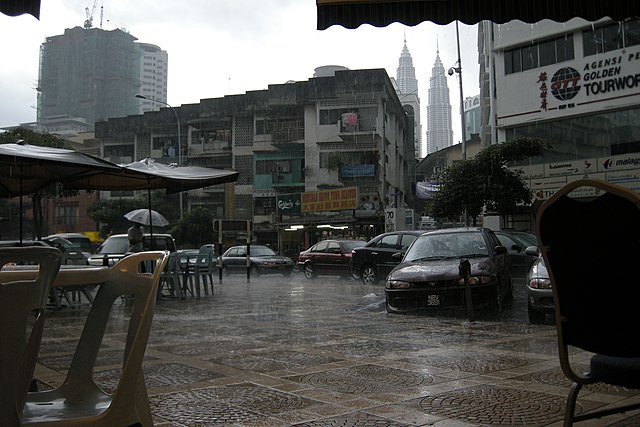
Thammasat University students who are interested in law, history, political science, human rights, gender studies, sociology, social and cultural anthropology, climate change, foreign policy, feminism, and related subjects may find a newly available book useful.
Feminist Frontiers in Climate Justice: Gender Equality, Climate Change and Rights is an Open Access book, available for free download at this link:
https://directory.doabooks.org/handle/20.500.12854/97510
It is edited by Professor Cathi Albertyn, who teaches equality, law and social justice at the School of Law at the University of the Witwatersrand, South Africa, and colleagues.
The TU Library collection includes other books about different aspects of climate justice.

According to the publisher’s description,
Feminist Frontiers in Climate Justice provides a compelling demonstration of the deeply gendered and unequal effects of the climate emergency, alongside the urgent need for a feminist perspective to expose and address these structural political, social and economic inequalities. Taking a nuanced, multidisciplinary approach, this book explores new ways of thinking about how climate change interacts with gender inequalities and feminist concerns with rights and law, and how the human world is bound up with the non-human, natural world. With contributions from leading scholars in law, feminism, human rights and politics, this book considers how equality is conceptualised, experienced and used in policies, law and practice that are integral to climate justice. Chapters reveal how international and national policy and legal frameworks fall short on gender equality and climate justice. Overall, the book demonstrates that the climate crisis demands an ambitious and transformative approach to equality, including developing feminist ideas of care and social reproduction, to reconstruct law and policy towards a more just world for all. This ground-breaking book will be essential reading for scholars across many areas of law including environmental law, human rights, public international law, law and gender, and law and development. Its discussion of the international framework alongside in-depth case studies and assessments of women’s mobilization strategies will also be highly relevant to social scientists, officials in international organizations, policymakers, lawyers and activists.

The book’s Introduction states:
Today’s ecological crisis is the biggest threat to the future of humanity and the planet. However, its impact is uneven and unequal. As is increasingly obvious, the effects of human-induced climate change are most keenly felt by those who have fewer resources and less power: groups who are poor, vulnerable and disadvantaged, especially in the global south. Intersectional and cascading gender inequalities place women in particular positions of vulnerability as the effects of climate change have the potential to reinforce, reconstruct and reshape gendered inequalities and erode social, economic and legal advances. It is becoming ever more apparent that climate change cannot be addressed without addressing systemic political, social and economic inequalities at local, national and global levels. In the face of the existential threat posed by climate change, women have been described as vulnerable victims, as active champions of a green and sustainable future, as holders of specialized knowledge, as tokens to be slotted into scientific and technical regimes, as wayward decision makers threatening to destabilize ecosystems, and as stalwart trustees of nature for future generations. These ascriptions run the risk of reproducing familiar gendered tropes that feminists have long resisted, threatening to undermine and even reverse feminist gains in rights, law, policy and practice. In reality, women’s relationship to climate change is complex and nuanced, defying generalizations and deserving of deeper engagement from a feminist perspective. It is the need for such engagement in the face of the complex connections between climate change, gender inequalities, and feminist concerns with rights and law that triggered this edited volume. As feminist legal scholars, we have been working collectively on issues relating to substantive gender equality and human rights since 2006. Our aim has been to expand cooperation among feminist legal scholars, from both the north and south, to analyse the effects of global and local inequalities across different regions, groups and issues. We have focused on a range of critical contemporary topics in the broad field of law, society and human rights, from the meaning of substantive equality, to questions of austerity and precarity, the multiplying effects of intersectional inequalities, the challenge to rights in an increasingly divided and unequal world, and the impactsf culture, religion and neo-conservative movements on ogender equality and women’s rights. None of us is rooted in the field of climate change, however we are deeply aware of the urgency of this debate for feminist scholars and felt it important to engage it from the perspective of feminist legal theory, doctrine and practice. For us, climate change inevitably and irreversibly affects gender equality, which demands a deeper understanding of its impacts and the role of law in addressing them. For too long, the fields of environmental and climate change, on the one hand, and women’s rights and feminist legal studies, on the other, have failed to explore fully points of overlap and areas of mutual reinforcement. This is not only a missed opportunity, but can cement inequality in international and national policy frameworks, in law and in practice. For example, the minimal engagement of climate change regimes with women’s rights can result in mitigation and adaption efforts unreflectively reproducing existing forms of disadvantage, exclusion and stigmas. At the same time, the relative silence of human rights scholars on the threats of climate crisis for women’s human rights means that law and policy are failing to respond to the lived reality of women whose rights are already undermined by climate and environmental degradation.
The intention of this collection is to break these silos. By bringing together a wealth of expertise that stretches across disciplines, it queries, from multiple perspectives, whether rights and law contain the radical potential to redress the climate crisis and women’s inequality in a synergistic manner. The chapters explore how commitments to women’s equality, rights and climate justice can be harnessed in democratic and authoritarian regimes; in international and national law; across generations; in plural legal systems; in the economy and the labour market; and in public policies to address gender-based violence and reproductive justice. The complexity of the current challenges triggered by the climate crisis calls for debates that embrace the intertwining of areas, arenas and strategies, cut across generations, and involve both community and legal struggles at local and international level so that we can transform our futures and achieve gender equality and climate justice.

(All images courtesy of Wikimedia Commons)
